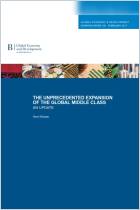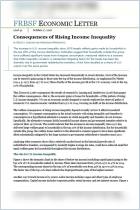Melden Sie sich bei getAbstract an, um die Zusammenfassung zu erhalten.

Melden Sie sich bei getAbstract an, um die Zusammenfassung zu erhalten.
Ali Alichi
Hollowing Out
The U.S. middle class is shrinking as households climb into higher, or slip into lower, income brackets.
Finance & Development , 2016
Was ist drin?
The decline of the US middle class may have alarming consequences for the economy.
Recommendation
The American Dream seems to be fading, as the US middle class struggles to maintain a foothold. Between 1970 and 2014, middle-income households shrank from 58% to 47% of all US households. Until 2000, moving into the ranks of upper-income households accounted for most of the attrition. But since then, the number of middle-income households that slipped into lower income status has outpaced those rising to higher income levels. This “hollowing out” eats away at consumption, a major driver of economic growth in the United States. This powerful article by economist Ali Alichi provides a thoughtful look at the consequences of a dwindling middle class. getAbstract recommends it to policy makers and economists.
Summary
About the Author
Ali Alichi is a senior economist at the International Monetary Fund.





















Comment on this summary